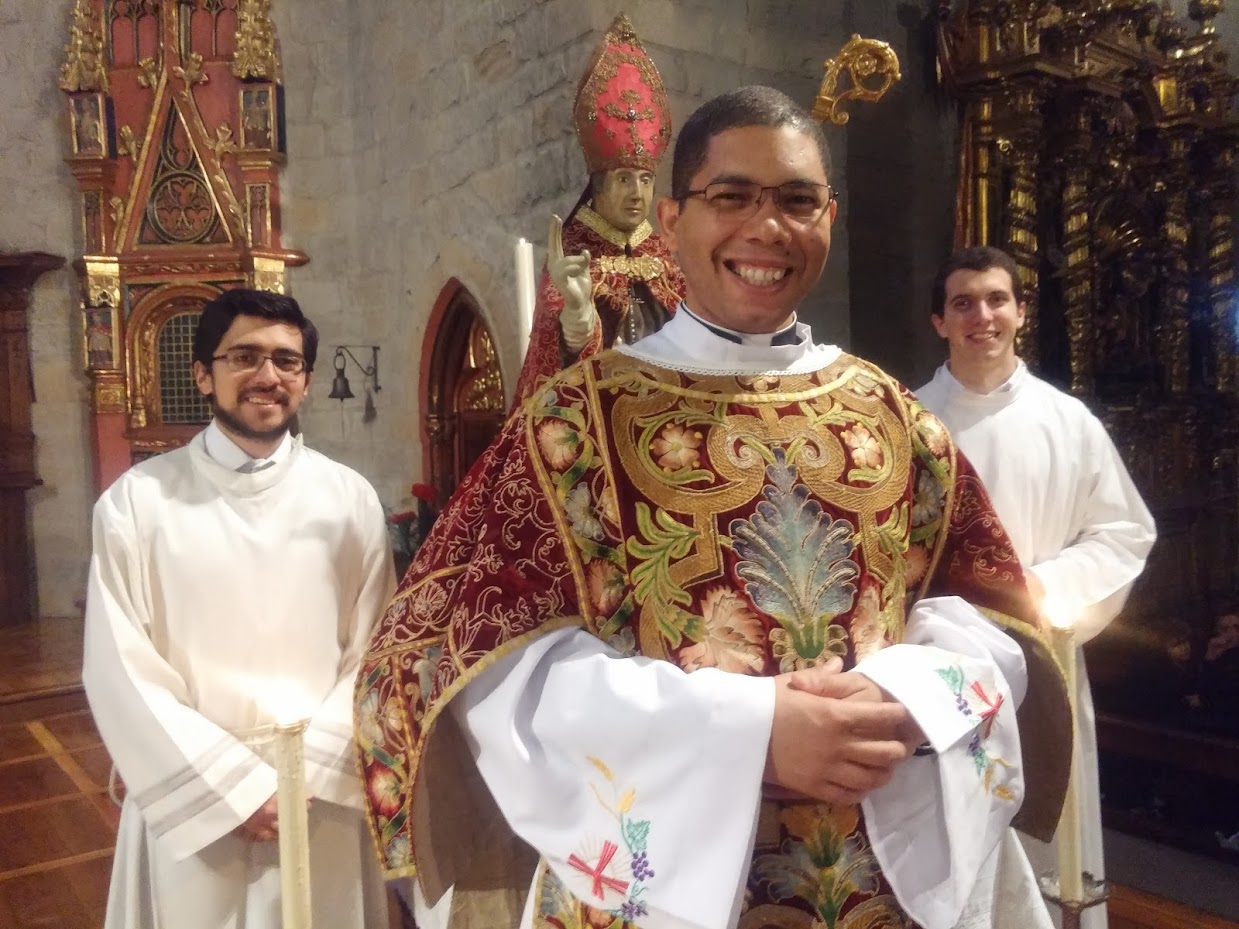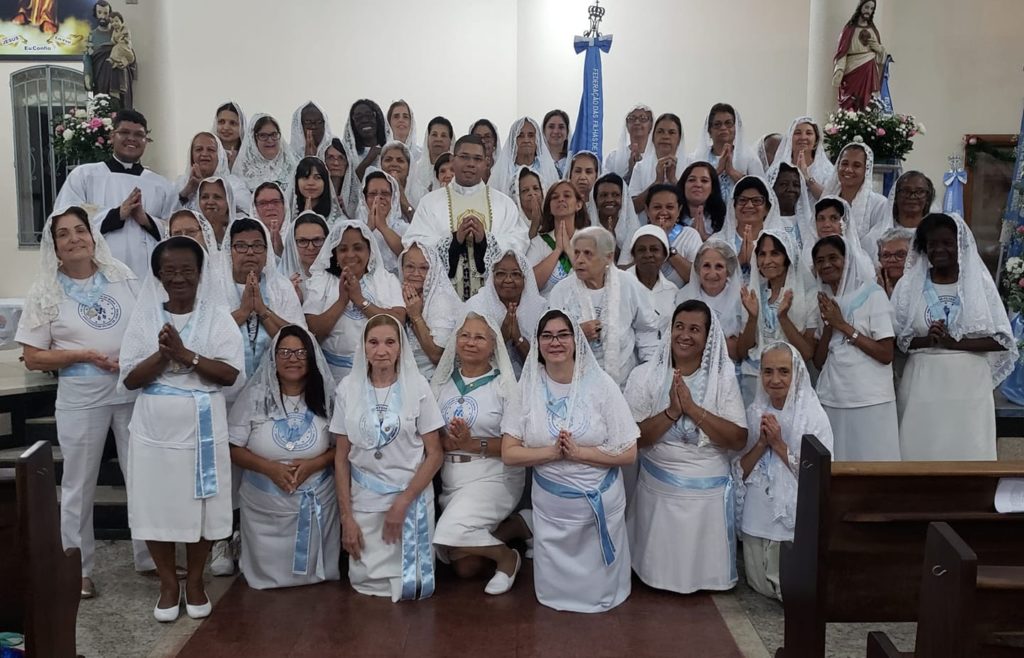
The Social Action Board of the CARF Foundation delivers each year more than 60 sets of complete Holy Vessels to deacons and priests from all over the world who study in Pamplona and Rome.
They are newly ordained priests who return to their countries to carry out their pastoral work. On many occasions, they must to celebrate Mass or impart the sacraments in remote places or parishes lacking the means to do so.
The Holy Vessel case contains everything necessary to celebrate Holy Mass with dignity in any location, without the need for prior installation.
Douglas Lyra da Silva, parish priest of the Archdiocese of São Sebastião do Rio de Janeiro and former student of the Bidasoa International Seminary (Pamplona) tells us in a testimony how this set of Sacred Vessels has helped him.
"The case I received has helped me on several occasions. One of the most endearing moments was when I was I used all the sacred vessels and all the elements in their entirety at my grandmother's birthday party at her residence.
This gift is a great service for the care of the sick in nursing homes and hospitals. I carry the holy oil and the aspersorium to administer the Anointing.
There are no words to describe the joy that our sick little brothers feel when they receive the comfort and encouragement of the priest. The sacraments relieve them of their pain. In these moments, it is not only the priest who is in front of them, but also all the benefactors that will make it possible to exercise the ministry with dignity.
It also helped me enormously when I celebrated Holy Mass in my room because I had to be confined and isolated by the COVID last January.
In addition, thanks to the set of holy vessels, I was able to celebrate Holy Mass at the "flag peak" on a day with the young people.
Celebrating Holy Mass in your room thanks to the Holy Vessel Case.
Douglas is from Rio de Janeiro and is currently the pastor of the Church of the Eucharistic Heart of Jesus in the Archdiocese of São Sebastião de Rio de Janeiro. Thanks to the Sacred Vessel Kit given to him by CARF's Social Action Board, he has been able to celebrate Mass in some places lacking the means to do so.
"There are no words to describe the joy our sick little brothers feel when they receive the comfort and encouragement of the priest. The sacraments relieve them of their pain. In these moments, it is not only the priest in front of them, but also all the benefactors who will make it possible to exercise the ministry with dignity," he says.
"It has been five years since I returned to my archdiocese, in the city of Rio de Janeiro, Brazil. I studied and resided in the Bidasoa International Ecclesiastical College from 2012 to 2016. My rector was Don Miguel Ángel Marco de Carlos, the responsible formator Don Emílio Forte López and the spiritual director Don Joaquín Sedano.
One of the good memories I have of those four years was the work they requested for computer services, the construction of the web page and the live transmission of the ordinations in St. Nicholas Church, when the means were still scarce, It was an adventure.
I did everything with great pleasure and at that time it was a path of sanctification for me, of service to our brothers and gratitude towards Bidasoaa home that forms us in the Love of the Heart of Jesus.
I was ordained a priest at the age of 31, on August 13, 2016, in my home parish, St. Blaise, in the Madureira neighborhood where I grew up, in one of the suburbs of the city.
Now, I carry out pastoral work at the Eucharistic Heart of Jesus Parish.in the most peripheral area of Rio de Janeiro. I arrived here while still a deacon and after ordination, I stayed on as Parochial Vicar, until my appointment as pastor on March 5, 2018.
Here, in addition to the Mother Church, we have six other branch parishes: St. Michael the Archangel, St. Sebastian and St. George, Our Lady of the Head and St. Luke, Our Lady of Fatima, Our Lady of Graces of the Miraculous Medal, St. Peter. Of these, 4 are still under construction.
Of these four years as pastor, two have been spent in the midst of the COVID pandemic. Many were isolated in fear in their homes. But we priests continued to work, celebrating Mass and broadcasting on social networks, even when we had to close the doors (there was no public celebration for some time).
We also went many times to the cemetery to bury the victims of the virus. And on occasion, we gave communion and anointing to the elderly who needed it. The mission did not stop, despite the risk.
Currently, the bishop has entrusted me with the task of accompanying vocations in the vicariate or "West" region of the city: I am the spiritual director of the apostolate of prayer in the Vicariate. In addition, I coordinate two groups of couples of the "Teams of Our Lady", and I am also a member of the presbyteral council of the archdiocese.
Fr. Douglas greeting children from the peripheries.
"This gift, the Holy Vessel Case, is a great service for assisting the sick in nursing homes and hospitals. I carry the holy oil and the aspersorium for administering the Anointing."
What are the challenges of the mission in Brazil, a continental country with an incredible diversity of culture and social realities?
I believe that in the urban region where I am, the work is aimed at couples, children and young people, so that they look at faith with closeness and as a response to the existential crisis that leads to bad dependencies of all kinds, and to the loss of the meaning of life and the value of a life in community.
There are many distractions, mainly on the Internet, that induce them to non-Christian practices and conceptions, based on a perfidious 'freedom', on 'click for visibility' and on 'consumerism' that does not satiate the soul.
There is still the loss of catechesis and transmission of the faith within the family, because there are few Christian marriages, which drowns the future of Christianity in a gloomy perspective towards darkness.
Finally, I would like to say good-bye by thanking the benefactors The CARF Foundation for the Sacred Vessel kit, and for its dedication to providing the conditions for a good formation for priests in dioceses around the world.

Marta Santín, Journalist specializing in religious information